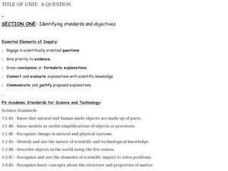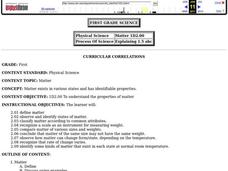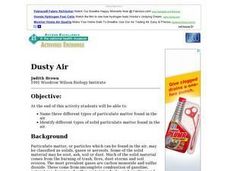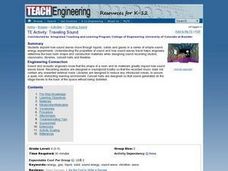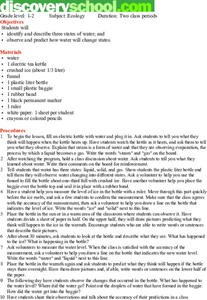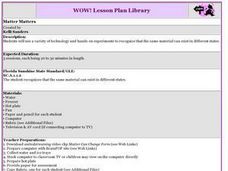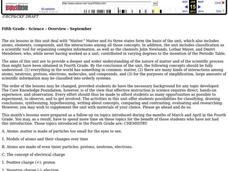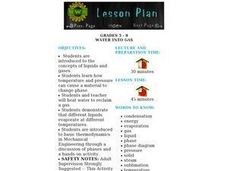Curated OER
Science: Identifying Properties of Matter
Young scholars observe a demonstration of the the three forms of matter - air, water, and solids - in plastic bags. After discussing the properties, they transfer them to a Venn diagram. Finally, students identify five items in the...
Curated OER
Solids, Liquids, and Gases
Students explore the three main forms of matter: solid, liquid, and gas. They examine concrete examples of each, using their five senses and "experimenting" to find differences in them. They find pictures of each, cut them out and past...
Curated OER
A Matter of Fact
Third graders define matter as anything that takes up space and has mass, recognize, through experimentation and observation, that matter exists in three forms, including solid, liquid, and gas, and discuss characteristics of each form...
Curated OER
Matter and Energy
Students participate in a small group read aloud of the short story, "Cerium" by Primo Levi. They answer several questions about the story and then relate the reading to a lecture on Kinetic theory. After the lecture they apply the...
Curated OER
A QUESTION
Students engage in scientifically oriented questions. They give priority to evidence, draw conclusions/formulate explanations and connect/evaluate explanations with scientific knowledge. Students communicate and justify proposed...
Curated OER
Matter
First graders study and define matter. They observe and identify states of matter along with common attributes and study how matter can change form or change its state depending on temperature.
Curated OER
Dusty Air
Students discover the types and amounts of particulate matter found in the air. They collect particulates using a Petri dish coated with Vaseline then classify and count the collection under a stereoscope.
Curated OER
Properties of Matter
Third graders explore forms of matter through reading, hands-on science activities, and research using the Internet. Students create a booklet, directions given, that they title and decorate, to later serve as a review visualization...
Curated OER
Phases of Matter
Eighth graders practice using correct vocabulary and apply content knowledge related to phases of matter when answering questions about situations or observations from everyday life.
Curated OER
Defining Density as a Relationship
Students investigate density and its relationship to air and gas. Students perform experiments to determine if gases have mass. They explore possible ways to figure out the density of gases.
Curated OER
Traveling Sound
Young scholars explore how sound waves move through liquids, solids and gases in a series of simple sound energy experiments. They describe how sound needs molecules to move and that changing the medium that it travels through changes...
Curated OER
Ecology
Students identify and describe three states of water. They predict how water will change states.
Curated OER
The Goldilocks Principle: A Model of Atmospheric Gases
Students discuss the characteristics of the Goldilocks Principle. They discover the pressure and chemical composition of Venus and Mars. They discuss how the Earth's temperature is affected by the atmosphere.
Curated OER
It's a Matter of Change
Learners watch a video on matter and identify examples of solids, liquids and gases in the classroom. They discuss the attributes for each kind of matter and conduct an experiment to explore how matter can change form.
Curated OER
The Three States of Matter: Energy Matters
Students examine the states of matter; solids, liquids and gases. They explain how the states of matter change from one to another.
Curated OER
Gas Laws Experienced
Students discover relationship between temperature pressure and volume as they perform research and experiments.
Curated OER
Teaching Matter with The Wild Christmas Reindeer
Second graders learn the proper way to take measurements, explore the properties of objects and expand their vocabulary.
Curated OER
Matter Matters!
Second graders experiment with heating and cooling and research the states of matter (solid, liquid, gas).
Curated OER
State of Matter - Atoms
Learners examine and discuss how atoms change from solid to liquid to gas. They inflate a balloon by melting ice that converts to steam, and discuss the results.
Curated OER
What Is the Matter with Water?
Second graders observe matter in all 3 states : liquid, solid and gas, in an ice cream soda. In teams, they are given ice and teams compete to be the first to melt their ice. Winner gets the ice cream soda. They draw examples of 3 states...
Curated OER
Cloud Watchers
Second graders read "The Cloud Book" by Tomie dePaola to jumpstart their cloud study. They offer examples of liquids, solids, and gases and chart them. They observe the making of a cloud in a demonstration. They discuss and draw...
Curated OER
Formation of Fossil Fuels
Young scholars research the origin of oil and natural gas to gather an understanding of the stages of fossil fuel formation. Then the class creates murals depicting the life cycle of a fossil fuel.
Curated OER
Matter
Fifth graders investigate the nature of matter and of the scientific processes associated with them in this series of lessons.
Curated OER
Water Into Gas
Learners investigate how temperature and pressure cause a material to change phase. They heat water to reclaim a gas. They demonstrate that different liquids evaporate at different temperatures.






